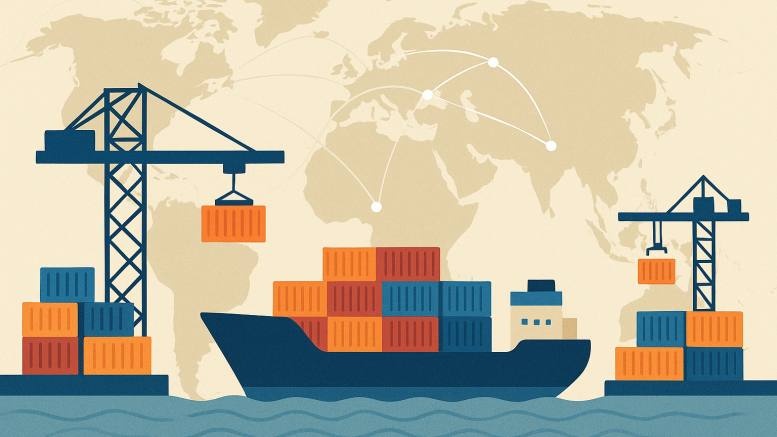Record Brazilian Agribusiness Exports

Best export performance in seven years for a basket of 53 high-value agro-industrial products, totaling US$ 2.4 billion and 534.9 thousand tonnes. This represents an increase of 32% in value and 18% in volume when compared to 2024. The growth reflects the diversification of the export portfolio and government support through regulatory simplification, tax reduction and the opening of over 125 new markets. (Ministry of Economy)
Confederation of Rural Associations of Buenos Aires and La Pampa reported that flooding in Buenos Aires province is affecting 5.8 million hectares, marking the most severe inundation in at least ten years. Satellite imagery shows 2 million hectares under water and another 3.8 million hectares unsuitable for planting, putting more than 1.5 million agricultural hectares at risk and implying estimated losses of US$ 2 billion. (Carbap)
China has received a 30,000-tonne shipment of Argentine soybean meal at the port of Nansha, marking the first officially approved import of this product since Beijing authorized such purchases in 2019. The cargo cleared customs and is viewed as opening a new trade route for the world’s largest soybean meal exporter. The shipment entered the market with good quality and highly competitive prices, suggesting that future purchases may continue if market conditions remain favorable. (Mysteel)

Agribusiness exports hit a record of US$ 15.49 billion in October, reaching US$ 13.7 billion. This was primarily driven by a 10.1% increase in shipping volume. Soybean, beef, sugar and coffee all reached record exports. China remains the main destination, while geographical diversification towards Asia, the Middle East and North Africa also underpinned the robust results. (Ministry of Agriculture)
The State of Rio Grande do Sul agribusiness exports reached US$ 4.4 billion in the 3Q25, with a 3.2% overall decrease when compared to the same period in 2024. This was caused by a lower soybean supply, resulting in a 12.8% drop in exports of soybean related products. However, the retraction was softened by strong growth in the tobacco and meat sectors, especially in the case of beef. (Rio Grande do Sul State Government)
Innovative Seed Solutions, an American company focused on genetic solutions for sorghum, announced an investment of US$ 10.3 million in the city of Uberlândia, State of Minas Gerais, with US$ 7.5 million invested to establish its corporate HQ and research station for South America. (Uberlândia City Hall)
Inter-American Development Bank and the Ministry of Environment and Climate Change signed a commitment to support strengthening governance, reducing deforestation and developing bioeconomy value chains in the Amazon. The initiative, part of the Inter-American Development Bank regional Amazonia Sempre [Forever Amazon Biome] program, focuses specifically on Sustainable Use Conservation Units already belonging to the Amazon Protected Areas Program. (Inter-American Development Bank)
Study by Zero Carbon Analytics indicates deforestation in Brazil’s Cerrado reduced soybean production potential by 34 million tonnes between 2013 and 2023, leading to an estimated US$ 9.4 billion in losses due to climate impacts caused by clearing native vegetation. The analysis, covering 840 municipalities, shows that deforestation increased aridity and reduced rainfall in key regions of the biome, directly affecting crop yields. (Zero Carbon Analytics)
Federal Government launched the Empreender Clima [Climate Entrepreneurship] platform during COP30 to expand access to green financing for micro and small businesses. The initiative offers credit starting at 4.4% per year, with up to 100% financing for sustainable projects and repayment terms of up to 25 years through the Climate Fund. The platform also provides training, technology tools and financial instruments to support the transition to a low-carbon economy. (Federal Government; BNDES)
The Ministry of Agriculture presented, during the event AgriZone at COP30, the National Voluntary Traceability Program, a new initiative to establish a unified national model for tracking Brazil’s agricultural supply chains. The system will enable automated data reading and integration of public and private information, enhancing efficiency, safety and transparency. According to the Ministry, voluntary traceability will be strategic for animal and plant health, food safety and to strengthen Brazil’s international credibility in agricultural markets. (Ministry of Agriculture)


Researcher Carolina Pañitrur presented data on the storage of recalcitrant seeds from native species of the Santa Inés forest. The research revealed that 70% of the relict forest species are recalcitrant, requiring specific conservation methods, such as storage in moist substrate at 5°C and stressing the need to move toward cryopreservation for long-term preservation. (National Institute of Agricultural Research)

Seguros Bolívar paid out over US$ 4.5 million to coffee farmers in the 1H25, because of damages caused by extreme weather events that triggered parametric insurance policies. According to the company, 81% of the total went to farmers in Nespresso’s AAA program across the regions of Caldas and Risaralda. The mechanism was activated by rainfall exceeding predefined thresholds and benefited more than 8,000 farmers. (Seguros Bolívar)
Colombia’s agricultural sector increased 2.4% in the 3Q25 when compared to the same period in 2024. The strongest year-over-year increases were seen in fishing and aquaculture (+16.4%), permanent coffee cultivation (+9.8%) and forestry and timber (+9.4%). Compared to the previous quarter, permanent coffee crops led the increase, with a 32% expansion. (DANE)

Paraguay exported 2.3 million tonnes of corn from the 2025 crop from June – October, tripling the volume shipped in the same period of 2024. Total production is estimated at 5.6 to 5.8 million tonnes, supporting the strong export pace. From January to October, shipments reached 2.8 million tonnes, generating US$ 468 million, which is twice of last year’s revenue. Brazil and Chile accounted for 86% of purchases. (Capeco)

China continues to show strong interest in commercial relationships with Uruguay, according to an analysis by Ignacio Bartesaghi of the Catholic University of Uruguay. He highlighted that the recent visit of China’s Vice Premier, Ding Xuexiang, to Montevideo signals China’s strategic focus on the region. Bartesaghi said Uruguay should revive its trade-opening agenda and reconsider advancing a free trade agreement with China, particularly amid geopolitical shifts and Argentina’s recent alignment with the USA. (UCU)

READ MORE:

